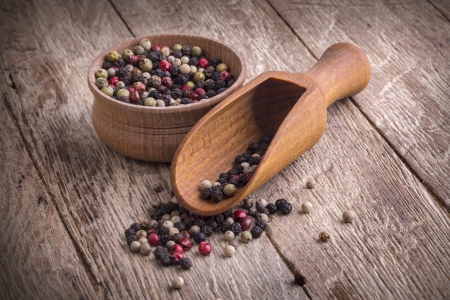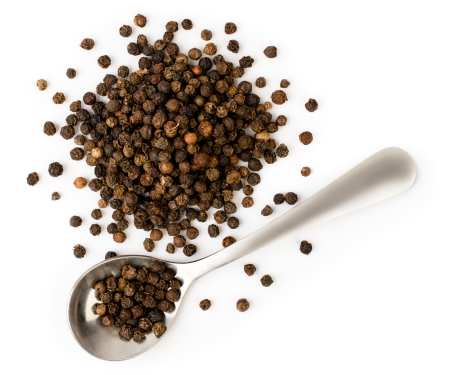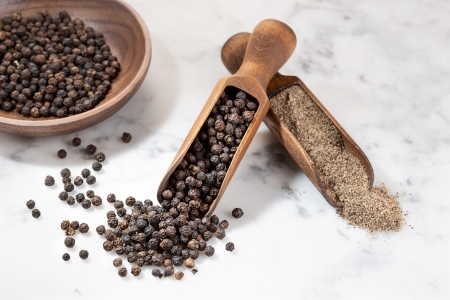Black pepper is a small round shaped dry berry of vine belongs to piperaceae family. It has a unique aroma and pungency due to the presence of oleoresin and alkaloids. Traditionally, it has widely used for preventing several health complications and extensively used in cooking for enhancing the flavor and nutritive value of food stuffs thus it is termed as ‘king of spices’.
Nutritional composition
- It contains carbohydrates, dietary fibre, proteins and fats (saturated and unsaturated fatty acids). The amino acid content of black pepper act as bioavailability enhancer
- It contains various micronutrients like calcium, phosphorus, iron, copper, manganese and chromium
- It also contains various fat soluble and water-soluble vitamins like Vitamin A, E, K, C and niacin or B3
- It contains phytonutrients, among which the most active compound is piperine (an alkanoids), which is responsible for its antioxidant, anti-inflammatory and medicinal property. Other alkanoids present in black pepper include peporidine, piperethine and chavirine
- It also contains volatile oil that shows antimicrobial activity
Properties of black pepper
Antioxidant property
- Piperine component of black pepper acts as a potent antioxidant and helps to protect the body from the harmful effects of free radicals by reducing its concentration within body and helps to prevent deadly cellular damages
- It is also well known for its significant cancer fighting ability. It helps to prevent replications of malignant cell and helps to suppress their growth
- It is more effective against prostrate, breast and colon cancer

Anti-inflammatory property
- Piperine is the most active compound of black pepper which has strong anti-inflammatory activity and helps to prevent swelling, inflammation and related pain
- It mainly helps in the inhibition of early inflammatory process (acute)
- It also shows significant effects on reducing the consequences of arthritis
Antimicrobial property
- It has seen that the piperine, flavones and terpenes are the main components of black pepper that have antimicrobial properties
- Consumption of black pepper is associated with preventing the growth and reproduction of several bacteria within body and hence helps to reduce their load. The Volatile oil of black pepper is also considered as an effective antimicrobial substance that inhibit the growth of both gram positive and gram-negative bacteria
- It has significant role on preventing the susceptibility of infectious disease
Pharmacological property
- Piperine and other phytonutrient constituents of black pepper are responsible for providing pharmacological activities
- It contributes to antispasmodic, antihypertensive, immunomodulatory, antithyroid, antiplatelets and antiasthmatic action, which is associated with preventing several degenerative health disorders

Health benefits
Role on digestive system
- Consumption of black pepper is good for digestion and helps to promote gastric functions
- It helps to stimulate the release of hydrochloric acid from stomach that helps in hydrolysis of sucrose and splitting of proteins hence facilitates their digestion
- It is associated with enhancing the activities of various enzymes of gastrointestinal tract and helps in the digestion of carbohydrates, proteins and fats
- It also helps to prevent diarrhea by reducing muscle spasm
- It has seen that black pepper has significant role in cleaning the intestine (due to its stimulatory effects on gastric acid secretion) and associated with promoting intestinal health, especially the colonic health. It plays significant role on preventing colon cancer
- It also helps to prevent constipation and other bacterial infestation related diseases
Role on preventing respiratory disease
- It helps to cure normal cold and cough
- It also helps to prevent chest congestion. It has seen that inhalation of black pepper added warm water is very effective for reducing chest congestion
- It is beneficial to consume tea or milk or other food stuffs by adding a pinch of black pepper on it, especially in winter. It helps to reduce the prevalence of common colds

Role on preventing joint pain
- The anti-inflammatory property of black pepper helps in the prevention of joint swelling and pain. Hence it is used as a remedial action for arthritis
- It also helps improve the symptoms of gout
Role on weight managements
- The phytonutrients contents of black pepper are responsible for lipolysis (breaking down of fat) and thus help to prevent unnecessary accumulation of fat within body
- It is also associated with enhancing the metabolism and results in increased energy expenditure that facilitates weight reduction
- It is better to add one pinch of black pepper to green tea before consumption for enhancing the catabolic rate of the body, which is considered as an effective way of adequate weight management
Role on nervous system
- Piperine component of black pepper helps in promoting brain function by decreasing the formation of plaque (amyloid)
- It also helps to prevent several neural degenerative disorders like Alzheimer’s disease, Parkinson’s disease
- It also helps to stimulate memory, skills and cognitive abilities
- It helps to prevent depression, one of the most vital mental problems that can lead an individual towards death. It has seen that chewing of raw black pepper is associated with releasing some mood inducing chemicals that helps to keep the brain shooting and calm that helps to reduce depression and anxiety as well

Role on detoxification
- It is associated with enhancing urination which helps to detoxify the body by eliminating all toxins from body
- It helps to enhance sweating that also promotes the elimination of toxin and helps to stimulate blood circulation
Role on nutrients absorption
- It has seen that black pepper is related with enhancing the absorption of some trace elements such as calcium and selenium from intestine and promotes their function. Apart from that it is closely related with enhancing the absorption of beta carotene that helps in the synthesis of Vitamin A
- It also helps in the absorption of curcumin (active component of turmeric) from intestinal epithelial cell
Role on skin
- It helps to prevent vitiligo, a skin disease characterized by development of white patches on skin
- It helps to maintain the original skin color
- It helps to prevent dark spots, wrinkle and premature ageing
Usage
Medicinal usage
- Consumption of black pepper with hot milk is beneficial to treat throat infection
- Traditionally it has been used to treat various gastrointestinal disorders such as flatulence, indigestion and diarrhea
- It acts as an effective antiseptic
- It has been therapeutically used for centuries for preventing colds, coughs and related respiratory disorders
- It acts as an effective remedial action for gum swelling and tooth decay
- It also used for relieving pain
- It helps to reduce blood cholesterol concentration

Culinary usage
- It is generally used in various kind of cooking for enhancing the flavor of the dishes
- It is used for marinating fish, poultry and meat
- It mainly used for preparation of curries
- Generally, it is used in savory cooking, but it can also be used in small quantity in foods like bread, pie and fruit cakes
- It can be added by sprinkling to foods such as soups, sauces, smashed potatoes, salad, omelet before consumption
Risk factors
Excessive consumption of black peppers may develop a burning after taste, gastrointestinal disturbances and mild infection.

Source:
Balasubramanian, S., Roselin, P., Singh, K.K., Zachariah, J. and Saxena, S.N., 2016. Postharvest processing and benefits of black pepper, coriander, cinnamon, fenugreek, and turmeric spices. Critical reviews in food science and nutrition, 56(10), pp.1585-1607.
Gorgani, L., Mohammadi, M., Najafpour, G.D. and Nikzad, M., 2017. Piperine—the bioactive compound of black pepper: from isolation to medicinal formulations. Comprehensive Reviews in Food Science and Food Safety, 16(1), pp.124-140.
Jiang, T.A., 2019. Health benefits of culinary herbs and spices. Journal of AOAC International, 102(2), pp.395-411.
Lee, J.G., Chae, Y., Shin, Y. and Kim, Y.J., 2020. Chemical composition and antioxidant capacity of black pepper pericarp. Applied Biological Chemistry, 63(1), pp.1-9.
Morsy, N.F. and Abd El-Salam, E.A., 2017. Antimicrobial and antiproliferative activities of black pepper (Piper nigrum L.) essential oil and oleoresin. Journal of Essential Oil Bearing Plants, 20(3), pp.779-790.
Shityakov, S., Bigdelian, E., Hussein, A.A., Hussain, M.B., Tripathi, Y.C., Khan, M.U. and Shariati, M.A., 2019. Phytochemical and pharmacological attributes of piperine: A bioactive ingredient of black pepper. European Journal of Medicinal Chemistry, 176, pp.149-161.
Takooree, H., Aumeeruddy, M.Z., Rengasamy, K.R., Venugopala, K.N., Jeewon, R., Zengin, G. and Mahomoodally, M.F., 2019. A systematic review on black pepper (Piper nigrum L.): from folk uses to pharmacological applications. Critical reviews in food science and nutrition, 59(sup1), pp.S210-S243.
Zuzanna Bober, Z., Agnieszka Stępień, A., David Aebisher, D., Łukasz Ożog, Ł. and Dorota Bartusik-Aebisher, D., 2018. Medicinal benefits from the use of Black pepper, Curcuma and Ginger. European Journal of Clinical and Experimental Medicine, (2), pp.133-145.



